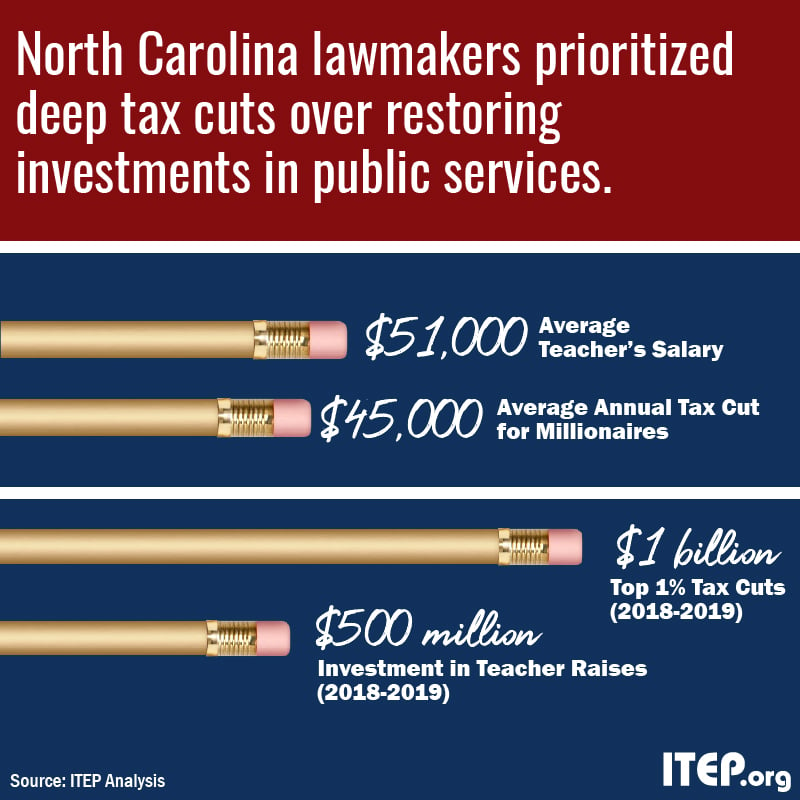This week the U.S. Supreme Court opened the door to legal sports gambling in the states (see our What We’re Reading section), which will surely be a hot topic in state legislative chambers, but most states currently have more pressing matters before them. The teacher pay crisis made news in North Carolina, Alabama, and nationally. Louisiana, Oregon, and Vermont lawmakers are headed for special sessions over tax and budget issues. And several other states have recently reached or are very near the end of their legislative sessions.
— Meg Wiehe, ITEP Deputy Director, @megwiehe
Major State Tax Proposals/Developments:
- North Carolina lawmakers kicked off their legislative session while 20,000 advocates for public education and teachers from across the state rallied in Raleigh. More than 40 school districts, representing two-thirds of all North Carolina students, closed for the day. Read ITEP’s take here and here on the march and the tax cuts that are driving action.
- After vetoing the Legislature’s budget and tax plans, Vermont’s Gov. Phil Scott called lawmakers back for a special session. Next week, Legislators will return to Montpelier to hash out education funding and the state’s response to federal conformity. At issue is whether to raise the property tax rate to fund education, or to use one-time revenue to fill the gap.
- Iowans are still sorting through the fallout of the regressive and expensive tax cut that lawmakers crafted in secret and then rushed through to passage last week. What’s clear so far: the wealthy will see the largest and most immediate tax cuts (on top of the federal tax cuts they just received), while lower- and middle-income residents will generally wait much longer for much smaller savings, and public priorities like education and infrastructure will inevitably suffer.
- The Louisiana Senate advanced a “demonstrative budget” that would cut all state agency budgets by 25% while preserving health care funding. Shortly thereafter, the governor called a second special session scheduled to begin next Tuesday, where lawmakers will hopefully work out a revenue plan to address the $650 million shortfall and pass a complementary spending plan.
- Minnesota lawmakers in the House passed the conference committee report addressing federal conformity and enacting personal income tax rates cuts. Despite pleas for lawmakers to choose a tax cut mechanism that would also benefit more low- and moderate-income families (such as expanding the state’s Working Family Credit), lawmakers ultimately agreed to cutting the bottom two personal income tax rates. While the Senate is expected to approve the bill, Gov. Dayton has said he won’t sign until the legislature approves an emergency school funding bill.
Legislative Sessions and Budget Debates Wrapping Up:
- Lawmakers in Alaska agreed upon a budget and brought their legislative session to a close this past weekend. This marks the first time that the state has drawn from its Permanent Fund Earnings Reserve Fund to cover government services. Connecticut lawmakers also finalized the state’s budget adjustment this week, restoring funding to many key programs. Gov. Dannel Malloy, cautioning against future deficits, has since signed off. Colorado lawmakers have also called a wrap to their legislative session, which notably included a compromise plan to fund transportation projects statewide. For the Colorado Fiscal Policy’s review of the session, read here.
- The District of Columbia Council approved a budget this week that increases funding for transportation infrastructure, affordable housing, arts, and other priorities, raising the revenue to do so through a 0.25-cent sales tax increase, a higher property tax rate on commercial real estate valued over $5 million, and increased taxes or fees on alcohol, cigarettes, and ride-sharing companies.
- Missouri lawmakers have been considering a constant stream of variations on two bills to slash income taxes, but are unlikely to pass either bill with the session ending this Friday.
- California‘s Gov. Jerry Brown has released his final budget proposal for the state, which allocates $14 billion for rainy day funds and contains modest spending increases (including some expansion of the state’s EITC). Read here for a review of the governor’s proposal from the California Budget & Policy Center.
- Illinois lawmakers are in the final weeks of legislative session and budget negotiations are underway. Gov. Bruce Rauner’s proposed budget proposal has been criticized as “precariously balanced,” relying on income sources that have proven historically unreliable and out of his control. However, one past obstacle to budget talks seems noticeably absent this year—the governor’s insistence that elements of his “turnaround agenda” be included in any spending plan as a condition of receiving his signature.
- Indiana lawmakers addressed federal conformity issues in a single day of special session last week, partially conforming to changes that would limit business pass-through excess-business losses.
- The Massachusetts Senate approved a budget that, in line with the governor and House proposals, would among other things increase the state’s Earned Income Tax Credit from 23 to 30 percent of the federal credit.
- The Georgia Budget and Policy Institute adds up the high costs of lawmakers’ tax-slashing session that wrapped up in March.
Further State Fiscal News:
- Despite great opposition from Amazon (including threats to stop two major expansion projects in the city), the Seattle City Council passed a reduced “head tax,” which would levy an annual tax of $275 per full time employee of large employers like Amazon to fund affordable housing and homelessness services. The dynamics giving rise to the tensions motivating the “Amazon tax” are not unique to Seattle—Mountain View, California, home to Google and several other large tech companies, is considering a similar tax.
- In Montana, the Bullock administration is proceeding with a supplemental appropriation (transfer from next year’s budget) to help fund Health and Human service programs that are currently in the red.
- Facing critics on all sides, Oregon Gov. Kate Brown has officially called a special session to address her proposal to extend the state’s pass-through break to sole proprietorships. Check out one common-sense proposal from the Oregon Center for Public Policy here.
- New Jersey legislators are balking at some of the fixes needed to the state’s tax code proposed by new Gov. Phil Murphy, which include instating a millionaires’ tax and reversing a sales tax rate cut the state could not afford but was pressured into when former Gov. Chris Christie and allies held the roads and infrastructure budget hostage in 2016. But a recent downtick in tax revenues may help convince them that an assortment of revenue solutions is needed.
- A legislative committee in Wyoming is currently studying the limits the state’s tax system, which heavily relies on the mineral industry, has on diversity. It has gone so far that the when the Revenue Committee explored the economic impacts of various companies across industries moving to Wyoming, the state lost money every time. Committee members are finding that “the lack of taxes in Wyoming could hinder the state’s ability to attract new businesses.”
- South Carolina legislators agreed to adjourn for now and return for short sessions in late May and late June to return to several issues, including the state budget and possibly a state response to the federal tax-cut bill.
- Florida policymakers appear no closer to averting a $28 million Department of Corrections funding cut that will cause a 40 percent cut in substance abuse and mental health programs that help prisoners re-entering society.
- Ill-advised tax cuts passed during North Dakota’s fracking boom are hitting home as central state agencies are being forced to cut services and reduce staff.
- Grocers in Oregon are advancing a campaign for a ballot initiative that would exempt food from taxes and fees. The initiative follows a 2016 effort to increase the Gross Receipts Tax on businesses. And in Washington state, in response to Seattle’s recently implemented soda tax, a similar effort aiming for the November ballot is underway to prevent the levying of new local sales taxes and cap existing rates on groceries.
- A small raise approved this year won’t likely be enough to appease Alabama teachers, who are paid less today than they were a decade ago.
- Seminole County, Florida, will begin accepting bitcoin payments for local taxes and fees.
What We’re Reading…
- Bloomberg reports on the recent wave of teacher strikes and walk-outs, showing how the wave is further evidence that supply-side economics and tax-slashing zealotry do not bring states prosperity as advertised.
- Governing reports on the U.S. Supreme Court decision to strike down the federal ban on sports gambling, turning the issue over to the states. One study estimates this could bring in up to $3.4 billion in state and local revenues, but that amounts to about one tenth of one percent of state and local general revenues, and even New Jersey, which led the lawsuit, doesn’t expect a significant revenue windfall. Connecticut, Mississippi, New Jersey, New York, Pennsylvania, and West Virginia are likely to be the first to start collecting such revenues, as they have already taken steps to legalize sports betting, and legalization is likely to be a hot topic in other states next year.
If you like what you are seeing in the Rundown (or even if you don’t) please send any feedback or tips for future posts to Meg Wiehe at [email protected]. Click here to sign up to receive the Rundown via email.





